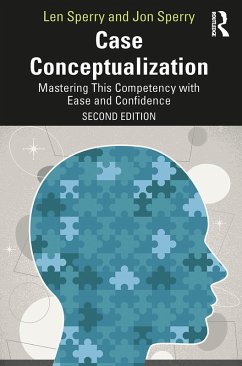
A Humane Vision of Clinical Psychology, Volume 2 (eBook, ePUB)
Explorations into the Practice of Compassionate Psychotherapy
Versandkostenfrei!
Sofort per Download lieferbar
46,95 €
inkl. MwSt.
Weitere Ausgaben:

PAYBACK Punkte
23 °P sammeln!
The purpose of A Humane Vision of Clinical Psychology, Volume II, is to encourage clinical and personal reflection on the part of reading clinicians, so as to foster more thought about the meaning and complexities of the therapeutic encounter. It does so by offering three clinical examples and a searching discussion of what each might teach us about the case at hand, ourselves, and the world.The book begins with an honest exploration of the limitations accompanying any and every attempt to write about the action of psychotherapy, which the first volume characterised as ineffable. More particul...
The purpose of A Humane Vision of Clinical Psychology, Volume II, is to encourage clinical and personal reflection on the part of reading clinicians, so as to foster more thought about the meaning and complexities of the therapeutic encounter. It does so by offering three clinical examples and a searching discussion of what each might teach us about the case at hand, ourselves, and the world.
The book begins with an honest exploration of the limitations accompanying any and every attempt to write about the action of psychotherapy, which the first volume characterised as ineffable. More particularly, it is suggested that the deepest therapeutic phenomenon, experiential "proximity," is itself neither fully observable to the participants nor capturable by a verbal account. These concessions, which effectively confine the therapeutic "mechanism" to the air of every encounter, threaten to make descriptions of psychotherapy useless. However, while we can never rightly describe the fundamental cause of change, we can describe its observable corollaries. It is then suggested that certain therapeutic postures-those of kindness, openness, and sameness-facilitate the expansion of the other's cognitive apparatus and thereby the "knowns" that inhabit their minds (the main goal of therapy, per Volume I).
A Humane Vision of Clinical Psychology, Volume II, is valuable for therapists, psychologists, psychiatrists, and other practitioners as well as graduate and undergraduate students in the fields of psychiatry, psychology, psychotherapy, mental health, social work, and philosophy.
The book begins with an honest exploration of the limitations accompanying any and every attempt to write about the action of psychotherapy, which the first volume characterised as ineffable. More particularly, it is suggested that the deepest therapeutic phenomenon, experiential "proximity," is itself neither fully observable to the participants nor capturable by a verbal account. These concessions, which effectively confine the therapeutic "mechanism" to the air of every encounter, threaten to make descriptions of psychotherapy useless. However, while we can never rightly describe the fundamental cause of change, we can describe its observable corollaries. It is then suggested that certain therapeutic postures-those of kindness, openness, and sameness-facilitate the expansion of the other's cognitive apparatus and thereby the "knowns" that inhabit their minds (the main goal of therapy, per Volume I).
A Humane Vision of Clinical Psychology, Volume II, is valuable for therapists, psychologists, psychiatrists, and other practitioners as well as graduate and undergraduate students in the fields of psychiatry, psychology, psychotherapy, mental health, social work, and philosophy.
Dieser Download kann aus rechtlichen Gründen nur mit Rechnungsadresse in A, B, BG, CY, CZ, D, DK, EW, E, FIN, F, GR, HR, H, IRL, I, LT, L, LR, M, NL, PL, P, R, S, SLO, SK ausgeliefert werden.













